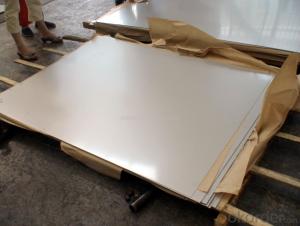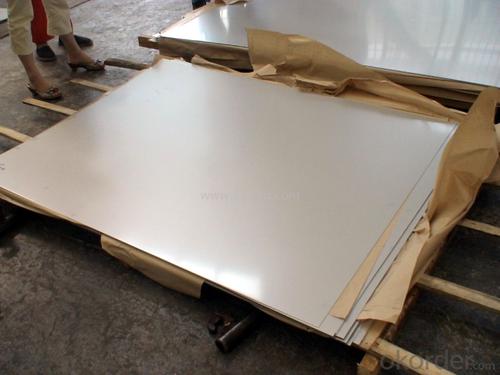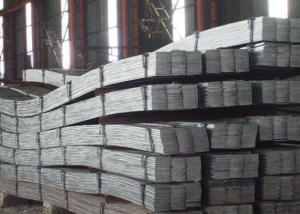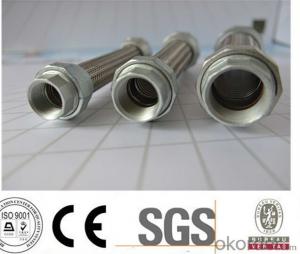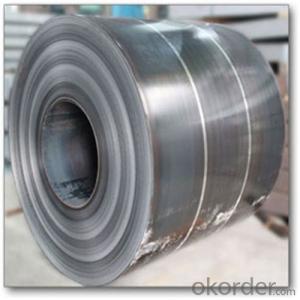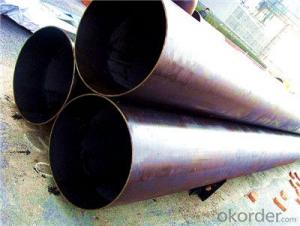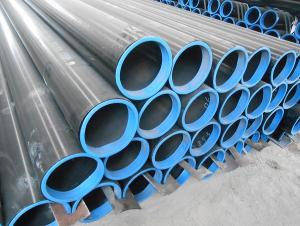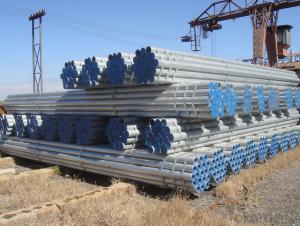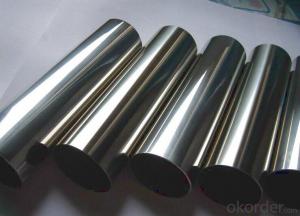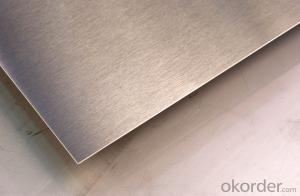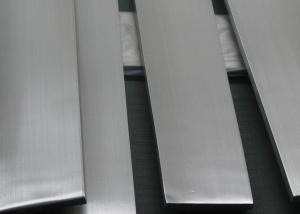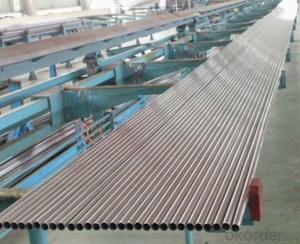ASTM Competitive price hot rolled 316l stainless steel plate
- Loading Port:
- Tianjin
- Payment Terms:
- TT OR LC
- Min Order Qty:
- 100 kg
- Supply Capability:
- 1000 kg/month
OKorder Service Pledge
Quality Product, Order Online Tracking, Timely Delivery
OKorder Financial Service
Credit Rating, Credit Services, Credit Purchasing
You Might Also Like

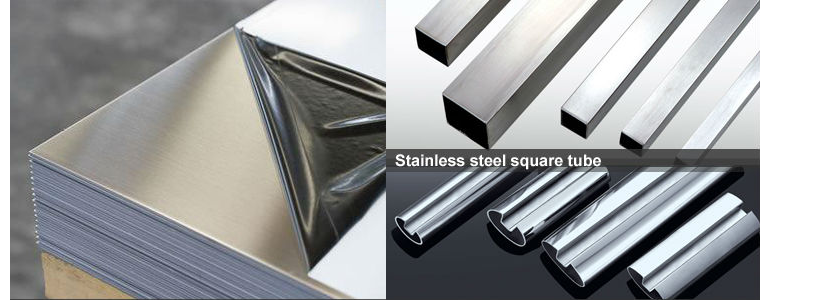
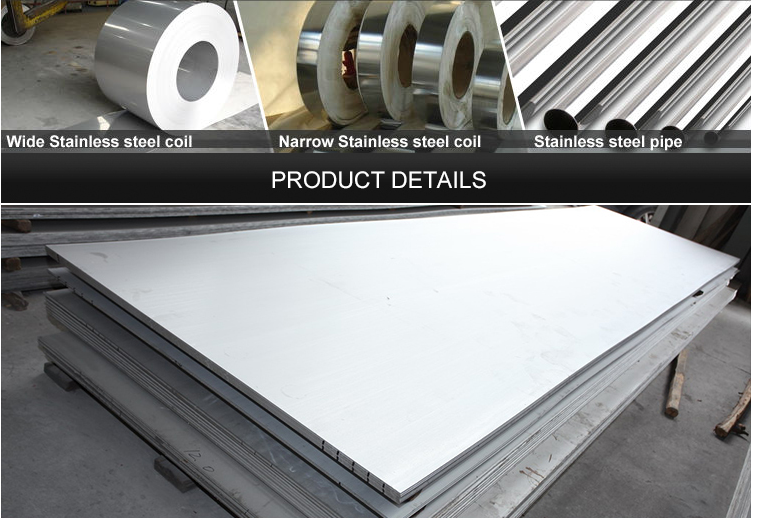


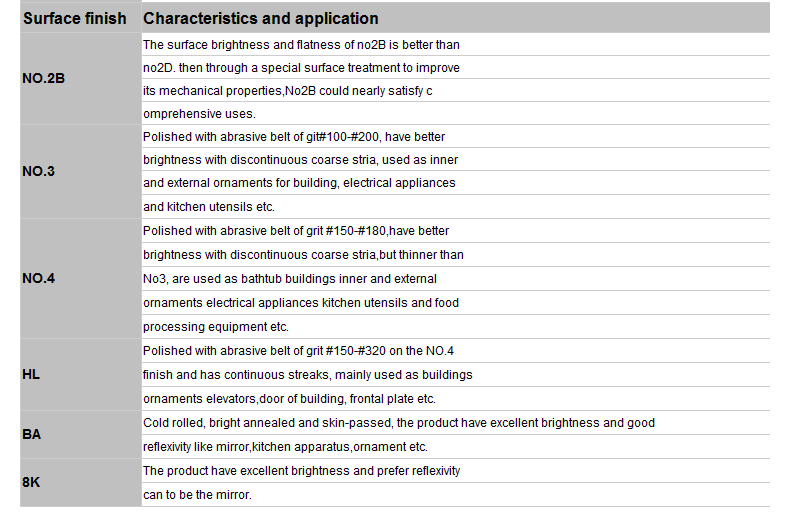
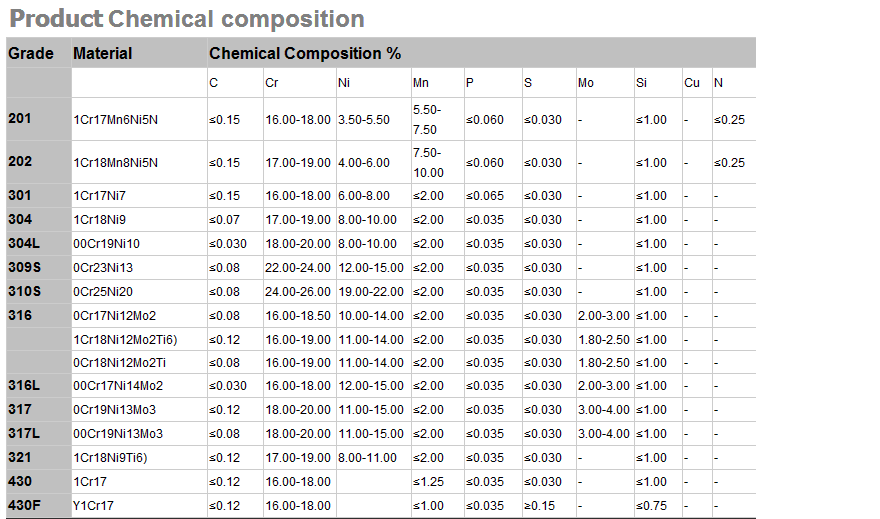
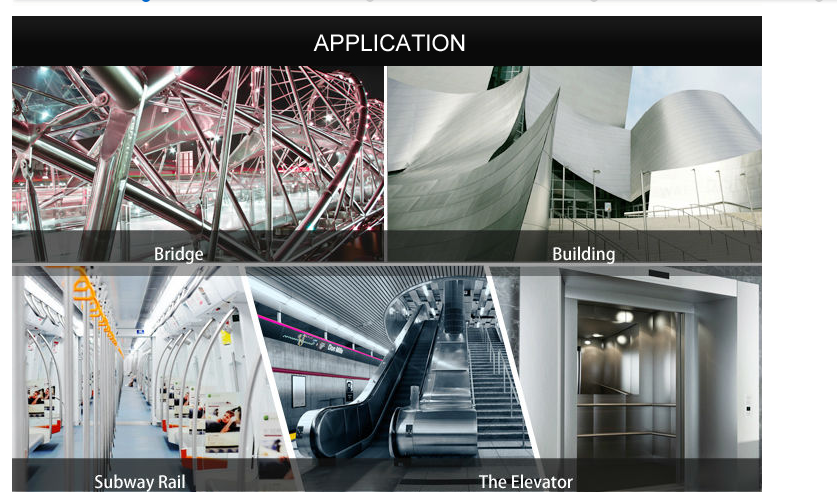
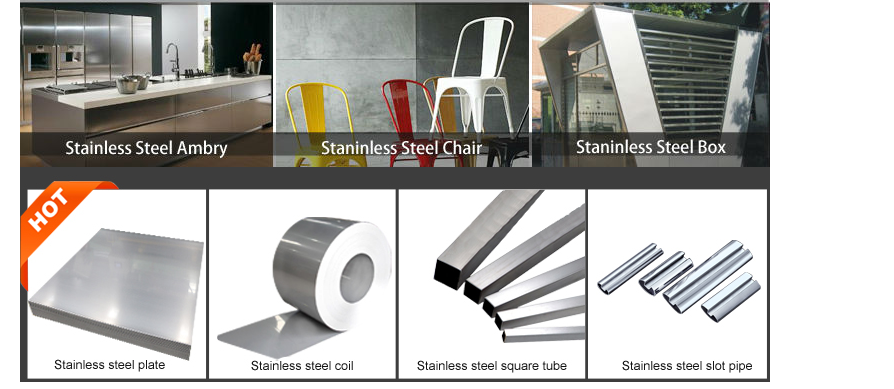
- Q: What is the difference between electropolished and passivated stainless steel pipes?
- Electropolished and passivated stainless steel pipes are both surface treatment methods used to enhance the corrosion resistance of the material. However, there are notable differences between the two. Electropolishing is an electrochemical process that removes a thin layer of stainless steel, leaving behind a smooth and bright surface. This process helps to eliminate surface imperfections, impurities, and contaminants, resulting in a highly clean and pristine finish. Electropolished pipes have improved resistance to corrosion, as well as enhanced cleanability and aesthetic appeal. On the other hand, passivation is a chemical process that creates a protective oxide layer on the surface of stainless steel. This layer acts as a barrier, preventing the formation of rust and enhancing the overall corrosion resistance of the material. Passivation is typically performed after fabrication or welding to restore the stainless steel's passive state and ensure long-term durability. In summary, while both electropolishing and passivation offer corrosion resistance benefits, electropolishing focuses on achieving a smooth and clean surface, whereas passivation forms a protective oxide layer. The choice between the two methods depends on the specific requirements, desired appearance, and intended application of the stainless steel pipes.
- Q: What are the standard sizes for stainless steel pipes?
- Depending on the industry and application, the sizes of stainless steel pipes can vary. However, there are commonly used standard sizes that are widely accessible. Typically, stainless steel pipes are manufactured in nominal sizes ranging from 1/8 inch to 72 inches in diameter. These sizes are categorized using the Nominal Pipe Size (NPS) system, which refers to the approximate internal diameter of the pipe. Commonly used NPS sizes for stainless steel pipes range from NPS 1/8 to NPS 36. Additionally, stainless steel pipes are offered in different schedules, which indicate the wall thickness of the pipe. The most frequently used schedules for stainless steel pipes are Schedule 5, Schedule 10, Schedule 40, and Schedule 80. It is important to note that these standard sizes may slightly vary depending on the country or region. Therefore, it is recommended to consult the relevant standards and regulations specific to your location or seek guidance from a supplier to determine the exact standard sizes of stainless steel pipes available in your area.
- Q: What is the welding procedure for stainless steel pipes?
- The welding procedure for stainless steel pipes typically involves a few key steps to ensure a strong and durable joint. Firstly, it is important to select the appropriate welding process for stainless steel, which is often Tungsten Inert Gas (TIG) welding due to its ability to produce clean and precise welds. Before beginning the welding process, the stainless steel pipes should be thoroughly cleaned to remove any contaminants, such as dirt, grease, or oxidation. This can be done using a degreasing agent or a stainless steel wire brush. Next, the pipes need to be properly aligned and fitted together. It is important to ensure that the gap between the pipes is even and consistent throughout the joint. This can be achieved by using clamps or tack welding to temporarily hold the pipes in place. Once the pipes are properly aligned, the TIG welding process can begin. This involves using a TIG torch to create an electric arc between a tungsten electrode and the stainless steel pipes. The arc generates intense heat, which melts the edges of the pipes and creates a fusion between the base metal and the filler material. During the welding process, it is crucial to maintain a stable arc length and control the welding speed to achieve a uniform weld bead. The use of a foot pedal or a remote control can help regulate the heat input and control the welding parameters. Throughout the welding process, it is important to protect the weld area from contamination. This can be done by using shielding gas, such as argon, to create an inert atmosphere around the weld zone. The shielding gas prevents the weld area from reacting with oxygen and other atmospheric elements, which could lead to defects in the weld. After completing the weld, it is recommended to perform post-weld cleaning and inspection. This involves removing any slag or spatter that may have formed during the welding process and visually inspecting the weld for any defects, such as cracks or discontinuities. In summary, the welding procedure for stainless steel pipes involves cleaning the pipes, aligning and fitting them together, TIG welding with proper arc length and welding speed, shielding the weld area with inert gas, and performing post-weld cleaning and inspection. Following these steps will ensure a strong and reliable weld joint for stainless steel pipes.
- Q: What are the common applications of stainless steel pipes?
- Due to their exceptional qualities, stainless steel pipes find widespread use across various industries. They are highly regarded for their corrosion resistance, durability, and ability to withstand high pressure and temperature. Here are some of the common applications of stainless steel pipes: 1. Plumbing and Water Systems: Stainless steel pipes are commonly employed in plumbing and water supply systems due to their ability to resist corrosion, durability, and capacity to handle high pressure and temperature. 2. Oil and Gas Industry: The oil and gas industry heavily relies on these pipes for the transportation of petroleum products. This is because stainless steel pipes exhibit high resistance to corrosion and possess excellent strength, enabling them to endure extreme temperatures and harsh conditions. Consequently, they prove ideal for offshore drilling and pipeline systems. 3. Food and Beverage Industry: The food and beverage industry extensively utilizes stainless steel pipes for the transportation of liquids and gases. These pipes are favored for their hygienic properties, resistance to corrosion, and ease of cleaning. They are frequently employed in dairy plants, breweries, and food processing units. 4. Pharmaceutical Industry: In the pharmaceutical industry, sterile conditions are essential when transporting chemicals, gases, and liquids. Stainless steel pipes are indispensable in this sector due to their corrosion resistance and capability to withstand high temperatures. 5. Construction and Architecture: Stainless steel pipes serve a multitude of purposes in construction and architecture, particularly for structural applications. They are utilized for handrails, balustrades, structural supports, and decorative elements. The aesthetic appeal, durability, and corrosion resistance of stainless steel pipes make them highly sought after. 6. Automotive Industry: The automotive industry relies on stainless steel pipes for numerous applications, including exhaust systems, fuel lines, and structural components. The high temperature resistance and durability of stainless steel make it a suitable choice for these demanding tasks. 7. Chemical Industry: The chemical industry extensively employs stainless steel pipes for the transportation of corrosive chemicals and gases. Their resistance to corrosion and ability to withstand high temperatures make them well-suited for chemical processing plants and refineries. 8. Marine Industry: The marine industry extensively utilizes stainless steel pipes due to their ability to resist corrosion caused by saltwater. They are crucial components in shipbuilding, offshore platforms, and underwater pipelines. Overall, stainless steel pipes are invaluable in industries that prioritize corrosion resistance, high temperature resistance, durability, and hygiene. Their versatility and reliability have made them the preferred choice across various industries worldwide.
- Q: Can stainless steel pipes be used in the construction industry?
- Yes, stainless steel pipes can be used in the construction industry. They are highly durable, corrosion-resistant, and can withstand extreme temperatures, making them suitable for a wide range of applications such as plumbing, heating, ventilation, and structural support.
- Q: What is the difference between seamless and electric resistance welded stainless steel pipes?
- Seamless and electric resistance welded (ERW) stainless steel pipes vary in terms of their production process and the characteristics of the resulting pipes. Seamless stainless steel pipes are made through hot rolling or cold drawing. A solid cylindrical billet or ingot is heated and pierced to create a hollow tube. This tube is then elongated and reduced in diameter to achieve the desired size and thickness. Since seamless pipes lack any welding seam, they possess higher strength, corrosion resistance, and pressure resistance compared to welded pipes. They are commonly used in high-pressure applications due to their ability to withstand stress and resist leaks or failures. In contrast, electric resistance welded stainless steel pipes are manufactured by applying heat and pressure to longitudinally welded stainless steel strips or plates. The edges of the strip or plate are heated and fused together under pressure to form a tube. ERW pipes have a visible welded seam along their length due to the welding process. Although the welded seam may slightly diminish the overall strength and corrosion resistance of the pipe, ERW pipes are still highly durable and suitable for various applications. They are frequently utilized in industries such as oil and gas, petrochemical, and plumbing. To summarize, the primary distinction between seamless and electric resistance welded stainless steel pipes lies in their manufacturing process and the presence of a visible welded seam. Seamless pipes are produced without welding, resulting in superior strength and corrosion resistance, particularly in high-pressure applications. Conversely, ERW pipes are formed through welding, resulting in a visible seam, but they still possess good durability and are widely used in different industries.
- Q: What is the difference between 17-4PH and 15-5PH stainless steel pipes?
- The main difference between 17-4PH and 15-5PH stainless steel pipes lies in their chemical compositions and mechanical properties. 17-4PH stainless steel contains about 17% chromium, 4% nickel, and 4% copper. It also includes small amounts of molybdenum and niobium. This composition gives it excellent corrosion resistance, high strength, and good toughness. It is commonly used in applications that require high strength, such as aerospace components, oil and gas equipment, and marine applications. On the other hand, 15-5PH stainless steel contains about 15% chromium, 5% nickel, and 3% copper. It also includes small amounts of molybdenum and niobium. This composition provides good corrosion resistance, high strength, and excellent toughness. It is often used in applications that require a combination of strength and corrosion resistance, such as valves, pumps, and shafts. In summary, while both 17-4PH and 15-5PH stainless steel pipes have similar corrosion resistance and high strength, their specific compositions and properties may make them more suitable for different applications.
- Q: What is the maximum pressure rating for stainless steel pipes?
- The maximum pressure rating of stainless steel pipes can vary due to several factors, including the stainless steel grade, pipe diameter and wall thickness, and specific application or industry requirements. Nonetheless, stainless steel pipes are renowned for their exceptional strength and resistance to corrosion, making them ideal for high-pressure applications. Generally, stainless steel pipes can withstand maximum pressure ratings ranging from a few hundred psi to several thousand psi. To determine the precise maximum pressure rating for a specific stainless steel pipe in a given application, it is imperative to refer to the relevant industry standards, codes, and specifications or seek guidance from a qualified engineer or manufacturer.
- Q: Can stainless steel pipes be coated or painted?
- Yes, stainless steel pipes can be coated or painted. Coating or painting stainless steel pipes can provide various benefits such as enhanced corrosion resistance, improved aesthetic appearance, and increased durability. However, it is important to note that proper surface preparation is crucial before applying any coating or paint to ensure adhesion and longevity. Additionally, it is recommended to use coatings or paints specifically designed for stainless steel to maintain its inherent qualities and prevent any potential issues such as flaking or peeling.
- Q: What is the difference between 410 and 316 stainless steel pipes?
- The chemical composition and intended applications set 410 and 316 stainless steel pipes apart. 410 stainless steel, a martensitic type, contains a higher carbon content ranging from 0.15% to 0.25% and a relatively lower chromium content between 11.5% and 13.5%. This composition grants 410 stainless steel pipes remarkable strength, hardness, and wear resistance. It is frequently employed in situations where corrosion resistance is not the primary concern, such as cutting tools, knives, and firearm components. On the flip side, 316 stainless steel is an austenitic variety with a higher chromium content, ranging from 16% to 18%, along with a significant nickel content between 10% and 14%. This composition provides 316 stainless steel pipes with exceptional corrosion resistance, particularly in environments containing chlorides or other corrosive agents. It finds widespread use in industries such as chemical processing, pharmaceuticals, food processing, and marine applications. To sum up, the primary distinction between 410 and 316 stainless steel pipes lies in their chemical composition and resulting properties. 410 stainless steel offers superior strength and hardness but has lower corrosion resistance compared to 316 stainless steel, which boasts high corrosion resistance but may have slightly reduced strength and hardness. The selection between the two depends on the specific requirements of the application, with 410 stainless steel being better suited for situations where strength and wear resistance are paramount, while 316 stainless steel is the preferred choice for applications demanding excellent corrosion resistance.
Send your message to us
ASTM Competitive price hot rolled 316l stainless steel plate
- Loading Port:
- Tianjin
- Payment Terms:
- TT OR LC
- Min Order Qty:
- 100 kg
- Supply Capability:
- 1000 kg/month
OKorder Service Pledge
Quality Product, Order Online Tracking, Timely Delivery
OKorder Financial Service
Credit Rating, Credit Services, Credit Purchasing
Similar products
Hot products
Hot Searches
Related keywords
